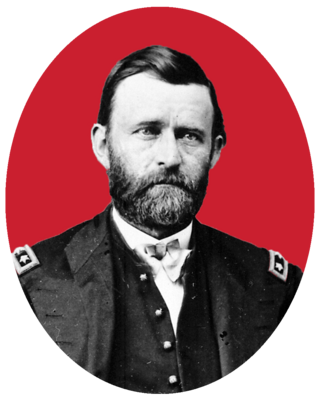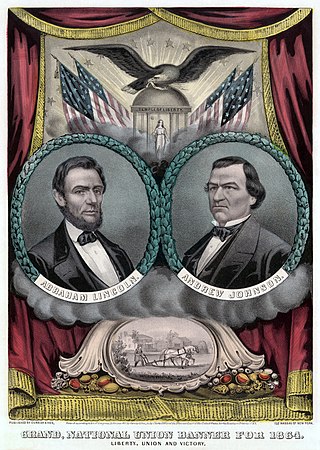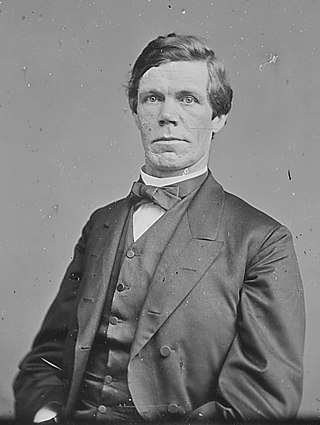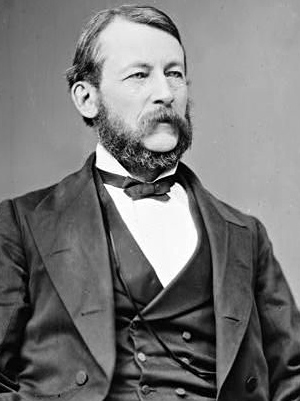
Events from the year 1866 in Canada.

James Falconer "Jefferson Jim" Wilson was an American lawyer and politician. He served as a Republican U.S. Congressman from Iowa's 1st congressional district during the American Civil War, and later as a two-term U.S. Senator from Iowa. He was a pioneer in the advancement of federal protection for civil rights.

John Armor Bingham was an American politician who served as a Republican representative from Ohio and as the United States ambassador to Japan. In his time as a congressman, Bingham served as both assistant Judge Advocate General in the trial of the Abraham Lincoln assassination and a House manager (prosecutor) in the impeachment trial of U.S. President Andrew Johnson. He was also the principal framer of the Fourteenth Amendment to the United States Constitution.

The 1866–67 United States House of Representatives elections were held on various dates in various states between June 4, 1866, and September 6, 1867. They occurred during President Andrew Johnson's term just one year after the American Civil War ended when the Union defeated the Confederacy. Each state set its own date for its elections to the House of Representatives. Members were elected before or after the first session of the 40th United States Congress convened on March 4, 1867, including the at-large seat from the new state of Nebraska. Ten secessionist states still had not yet been readmitted, and therefore were not seated.

The 1868 Republican National Convention of the Republican Party of the United States was held in Crosby's Opera House, Chicago, Cook County, Illinois, on May 20 to May 21, 1868. Ulysses S. Grant won the election and became the 18th president of the United States.

The New Orleans Massacre of 1866 occurred on July 30, when a peaceful demonstration of mostly Black Freedmen was set upon by a mob of white rioters, many of whom had been soldiers of the recently defeated Confederate States of America, leading to a full-scale massacre. The violence erupted outside the Mechanics Institute, site of a reconvened Louisiana Constitutional Convention. According to the official report, a total of 38 were killed and 146 wounded, of whom 34 dead and 119 wounded were Black Freedmen. Unofficial estimates were higher. Gilles Vandal estimated 40 to 50 Black Americans were killed and more than 150 Black Americans wounded. Others have claimed nearly 200 were killed. In addition, three white convention attendees were killed, as was one white protester.

The 39th United States Congress was a meeting of the legislative branch of the United States federal government, consisting of the United States Senate and the United States House of Representatives. It met in Washington, D.C., from March 4, 1865, to March 4, 1867, during Abraham Lincoln's final month as president, and the first two years of the administration of his successor, Andrew Johnson.

George Gilman Fogg was an American politician and diplomat who served as a member of the United States Senate for New Hampshire from 1866 to 1867. From 1861 to 1865, Fogg served as the United States Ambassador to Switzerland. Fogg had previously served as a member of the New Hampshire House of Representatives and New Hampshire Secretary of State.

The National Union Party was the name used by the Republican Party and elements of other parties for the national ticket in the 1864 presidential election during the Civil War. Most state Republican parties did not change their name. The name was used to attract War Democrats, border state voters, and Unconditional Unionist, and Unionist Party members who might otherwise have not voted for Republicans. The National Union Party nominated incumbent Republican President Abraham Lincoln of Illinois and Democrat Andrew Johnson of Tennessee for Vice President. They won the Electoral College 212–21.

William Loughridge was a pioneer attorney, judge, and three-term United States Congressman from Iowa.

John Adam Kasson was a nineteenth-century lawyer, politician and diplomat from south-central Iowa. Elected to the U.S. House six times, he repeatedly interrupted his congressional service to serve in the Diplomatic service in many different capacities.

The United States House of Representatives elections in California, 1867 was an election for California's delegation to the United States House of Representatives, which occurred on September 6, 1867 for the 40th Congress. The Democrats gained two districts from the Republicans.

The 1867 United States Senate election in New York was held on January 15, 1867, by the New York State Legislature to elect a U.S. Senator to represent the State of New York in the United States Senate. Incumbent Senator Ira Harris was not renominated for a second term in office. U.S. Representative Roscoe Conkling was elected to succeed him.

The 1866–67 United States Senate elections were held on various dates in various states. As these U.S. Senate elections were prior to the ratification of the Seventeenth Amendment in 1913, senators were chosen by state legislatures. Senators were elected over a wide range of time throughout 1866 and 1867, and a seat may have been filled months late or remained vacant due to legislative deadlock. In these elections, terms were up for the senators in Class 3.
The 4th New Zealand Parliament was a term of the Parliament of New Zealand.

On January 15, 1867, Simon Cameron was elected to the United States Senate by the Pennsylvania General Assembly for the third time; it had previously chosen him in 1845 and 1857. The legislature voted for Cameron over the incumbent, Senator Edgar Cowan, who though a Republican was endorsed by the Democratic legislative caucus. With the Republican Party holding a large majority in the legislature, the main battle was for its endorsement: the caucus of Republican legislators had voted for Cameron over Governor Andrew Curtin.

Massachusetts House of Representatives' 11th Norfolk district in the United States is one of 160 legislative districts included in the lower house of the Massachusetts General Court. It covers part of Norfolk County. Democrat Paul McMurtry of Dedham has represented the district since 2007.

During his presidency, Andrew Johnson, the 17th president of the United States, saw multiple efforts during his presidency to impeach him, culminating in his formal impeachment on February 24, 1868, which was followed by a Senate impeachment trial in which he was acquitted.
The first impeachment inquiry against Andrew Johnson was launched by a vote of the United States House of Representatives on January 7, 1867, to investigate the potential impeachment of the President of the United States, Andrew Johnson. It was run by the House Committee on the Judiciary.